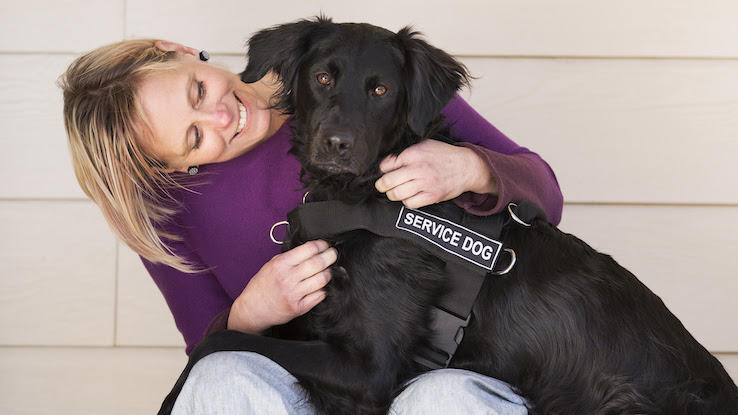Does The Tahiti Allow Confort Service Animals

Many people with disabilities seek support from service animals. In add-on to providing companionship, service animals are trained to perform tasks, from providing stability to picking upwardly items to alerting individuals near environmental hazards.
However, in contempo years, emotional back up animals have besides become more prominent. While both offering support, in that location are stark differences between the two — peculiarly when it comes to legal protections and training. Here, we'll delve into the differences betwixt service animals and emotional back up animals, from the types of services they provide to the training they require.
How Emotional Back up Animals Assist People with Mental Illnesses and Disorders
An emotional back up animal (ESA) is an animal companion that helps support an individual who is living with a mental disease or disorder. Most ofttimes, individuals ESAs are dogs, but other animals, from cats to miniature horses to lizards, can all provide emotional support and companionship. By providing companionship, these animals provide a sense of comfort for people with anxiety or depression. ESAs can as well assistance folks who experience panic attacks or who alive with anxiety disorders, such as post-traumatic stress disorder (PTSD) or obsessive-compulsive disorder (OCD).

Under the Americans with Disabilities Human activity (ADA), emotional support dogs are not technically considered service dogs. While ESAs can be trained to back up their owner, they don't usually receive professional person preparation, nor do they perform detail tasks. That is, providing condolement, while important, doesn't qualify as a service.
While ESAs no longer take legal protections on airplanes, many tin receive certifications so that in that location's no conflict with an individual's housing state of affairs. Moreover, psychiatric service dogs, who are trained to perform tasks that mitigate a person's psychiatric condition, such as PTSD, differ from ESAs and accept more protections.
Legal Protection Is Limited for an Emotional Support Animal (ESA)
With emotional support animals becoming more than mutual, patients oft request messages of documentation supporting their demand for an brute from their psychologist, therapist, or doctor. This official documentation of diagnosis is helpful to have on hand equally validation, only, unfortunately, ESAs and their owners yet face limited legal protections and rights in public places.

While the ADA covers trained, professional person service animals, it does not extend to emotional support animals. In practice, this ways that individuals with ESAs don't have unlimited access to public spaces. Depending on their own policies, businesses reserve the right to deny services to those with emotional support animals. Every bit of January 2021, airlines are no longer required to accommodate ESA owners, for example.
All the same, the Fair Housing Act (FHA) requires landlords to allow renters to continue emotional support animals in their residence — even if pets aren't allowed in the building. Under the FHA, landlords or property owners cannot require tenants to pay boosted fees for ESAs. Additionally, they can't ask for extensive data well-nigh a person's disability or request their medical records, nor can they crave that the animal have specific training.
Training Is a Must for Service Animals
Unlike ESAs, service animals are individually trained to perform specific tasks for people with concrete, sensory, psychiatric, intellectual, and/or mental disabilities. For example, guide dogs assist blind and depression-vision individuals navigate public spaces equally well as their homes. Service animals can too aid open doors, carry items and attain objects their owners may not be able to achieve. Some of these trained animals tin recognize the signs of seizures and will stand baby-sit over their owner or effort and find them help.

The Americans with Disabilities Human activity (ADA) does non require service dogs to be professionally trained, though it's certainly helpful. Individuals with disabilities tin can train their animals themselves, only sometimes professional training tin can get a long fashion. Afterwards all, it's of import for service animals to remain at-home, alert, and reliable, particularly in unfamiliar settings.
Over again, most service animals are dogs, and it can take upwards to 2 years for a dog to be considered "properly trained" as a service brute. If y'all need help finding a service dog, service dog agencies can help you find an animate being whose training aligns with the support you need. In public spaces, some service animals may wearable special vests, harnesses, collars, or tags that identify their status equally working dogs.
Service Animals Have Legal Protections
Under the Americans with Disabilities Human activity, service animals have many more legal protections than emotional support animals. Namely, this is considering service animals are needed throughout the day to help with physical tasks. As a upshot, these animals go pretty much anywhere without the fear of beingness denied access.

Yeah, service animals can be brought into restaurants, stores, libraries, and other public spots, even if pets aren't allowed. Service animals are even permitted on flights — though, typically, they must sit on the traveler'due south lap or at their anxiety. Though these animals can certainly be affectionate companions, they aren't exactly pets. Subsequently all, service animals are working animals, and they have very of import jobs to do.
Just like with emotional back up animals, individuals with service animals tin can acquire certifications wherein a md or mental health professional writes a letter that states their diagnosis and the style an animal will exist beneficial.
Dog Breeds That Brand Great Emotional Support and Service Animals
Certain dog breeds brand great emotional support and/or service animals based on their dispositions. Labrador retrievers, for example, are 1 of the virtually pop dog breeds when it comes to providing assistance, namely because they are naturally friendly, obedient and helpful. Equally you might expect, golden retrievers are much the same.

Although known for being protective baby-sit dogs, German language shepherds likewise brand great service animals. Well-behaved and easy to train, their size, strength, and attention to detail make them a great choice. Some other nifty pick? The border collie. This intelligent herding breed enjoys existence given a chore, though they may take a picayune more excess energy than the other breeds on this list.
Resource Links:
- "How Long Does it Take to Railroad train a Service Dog?" via Official Service Dog, Therapy Dog & Emotional Support Animal Registry
- "Which Breeds Make the All-time Service Dogs?" via K9 of Mine
- "Service Dogs, Working Dogs, Therapy Dogs, Emotional Support Dogs: What's the Departure?" via American Kennel Order (AKC)
- Ofttimes Asked Questions (FAQ) | The Americans with Disabilities Act (ADA) via The U.S. Department of Justice
- "No, the Off-white Housing Act of 1968 Didn't Stop Housing Discrimination in the U.S." via Reference
Does The Tahiti Allow Confort Service Animals,
Source: https://www.symptomfind.com/healthy-living/emotional-support-animal-vs-service-animal?utm_content=params%3Ao%3D740013%26ad%3DdirN%26qo%3DserpIndex
Posted by: mccoysuchown.blogspot.com


0 Response to "Does The Tahiti Allow Confort Service Animals"
Post a Comment